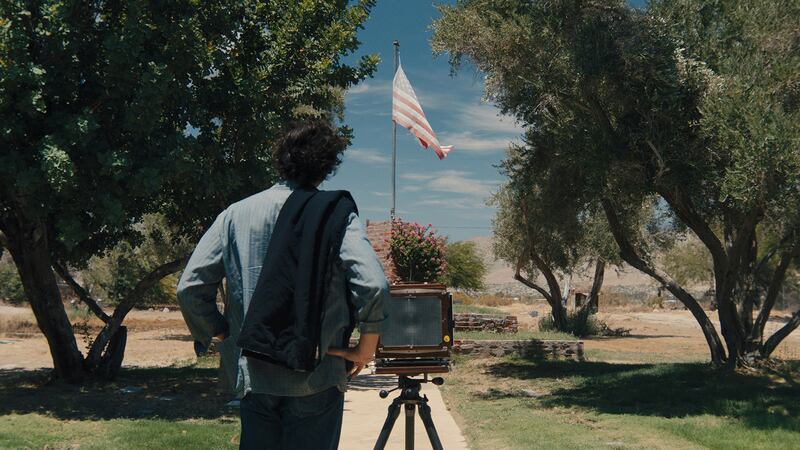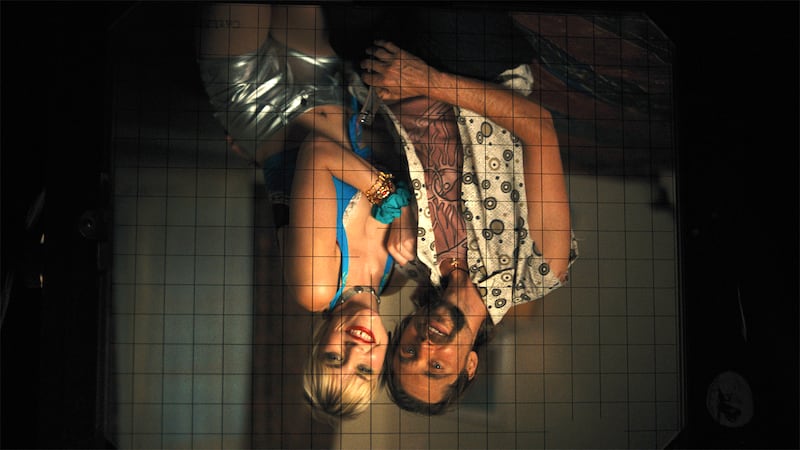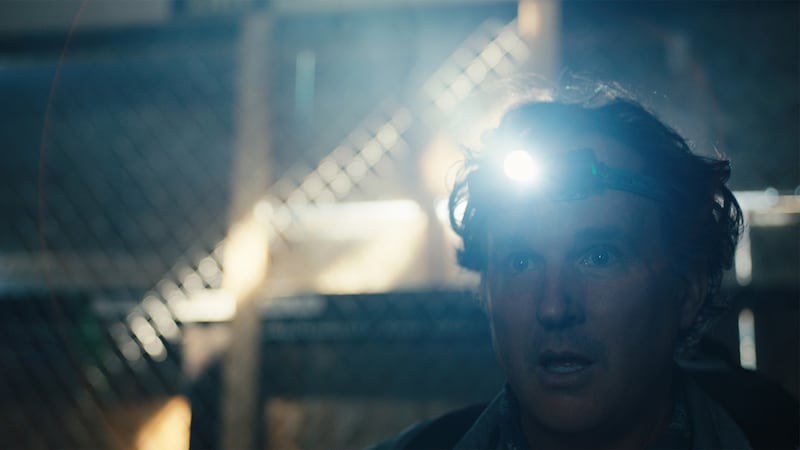When pulling a rabbit from the same hat as one of the greatest magicians who ever swished a wand, remember: Unless you’re performing for an audience that was born yesterday, the trick won’t work twice. Better not to try at all, though if you must, try making it different. Instead of a bunny, a honey badger; instead of a hat, an oven.
In his feature debut, A Desert, music video and short film director Joshua Erkman opts for that approach.
Imagine Alfred Hitchcock‘s Psycho, set chiefly in Yucca Valley, a 40-square-mile sprawl tucked by the corners of Joshua Tree National Park and the San Bernardino Mountains. Arid landscapes peppered by abandoned residences make up the film’s palette, removed from the city’s cluster of indie record stores, coffee shops, and taco stands, plus the blight of a Walmart Superstore. It’s as if Erkman went road tripping and wandered into the middle of Nowhere, USA’s very own middle—a setting tailored for A Desert and its homage to Hitchcock’s era-defining masterpiece.
But the engineering under the film’s hood is sophisticated beyond referentialism. This is a movie about “our relationship to movies,” Erkman told MovieWeb last month, rather than a movie about a specific movie.

The plot picks up with Alex (Kai Lennox), a photographer on a jaunt through the solitary places of the Southwestern U.S., where he shot the material for a career-defining photobook he published 20 years earlier; Erkman catches up with him using his 8x10 Deardorff to shoot a disused movie theater’s interior, left to ruin save for the seats. Each is lovingly draped with a dust cover, as if in hopes of manifesting the venue’s glorious resurrection in brighter days.
This beat, somber, tender, and a little macabre at the same time, is fleeting. Alex has other stops on his journey before he runs into Renny (Zachary Ray Sherman) and Susie Q (Ashley B. Smith)—siblings, Renny claims, perhaps pegging Alex as a sucker. Their encounter leads to debauchery in the evening, an uneasy ridealong the next day, with Alex reluctantly accepting Renny as his tour guide, and then to worse, a fate as abrupt as it is surreal as it is grisly; here, halfway through its running time, A Desert trades Alex for Sam (Sarah Lind), his anxious wife, and Harold (David “Jesus Lizard” Yow), the detective she hires to recover Alex, as its protagonists.
If the Psycho parallels aren’t immediately obvious at this point, they won’t become any more so going forward. That’s OK, though. Erkman isn’t Hitchcock. He understands well that what the master of suspense achieved with Psycho in 1960 is a rare sleight of hand, impossible to replicate. Over half a century later, we’re wise to the gag, and not so easily gulled into assuming the person we watch from the start is the one we’ll stay with through the conclusion.
That doesn’t make the changing of A Desert‘s leads any less sudden or heartbreaking; rather, it sets an expectation for what happens next, and that’s where Erkman opens A Desert up to trouble.
But if Psycho was Hitchcock’s lesson to American audiences that violence can strike anywhere, A Desert is Erkman’s morbid contemporization of the exercise: we seek out violence, even in the middle of nowhere, and blithely tromp past or tread upon American soil where blood has been spilled.
We call “foul” over foreign nations’ neocolonialism from the safety of left-leaning urban enclaves built on indigenous people’s ancestral lands; we fetishize gruesome murder cases through popular embrace of true crime gruel; we argue over the merits of removing Confederate monuments from public spaces, as if keeping them where they belong, like museums, isn’t an option. We wear “Boston Strong” T-shirts. We stall passage of common sense gun laws every time a lunatic with an assault rifle massacres a school.

Violence scribbles its signature across every quadrant of American life. To say that Psycho, released today, wouldn’t have the same effect as it did in the 1960s is a grave understatement, and a charitable claim to make besides, given that it’s impossible to verify. But in 2025, we understand what Hitchcock taught his viewers about their era: even in spaces where we pay for our safety, we’re never truly safe.
The Bates Motel is a spider’s web, except not as inviting. Both are preferable to the dilapidated lodging where Alex meets Renny and Susie; Alex can’t escape them, much as he wishes to, and in time they cajole him to partying with them, throwing back homemade spirits offered by his guests.
“That’s what you call my secret recipe,” Renny purrs. Alex knows he shouldn’t drink but submits to peer pressure anyway, despite Renny being so “off” that even a character in a movie should have sense enough to steer clear of him.
A Desert follows the thread of Alex’s naivete, and Erkman’s tribute to Hitchcock, into its final act, soaked by blood, brains, and a compellingly befuddling denouement that plays into that overarching theme about people connecting with screens (and the more of that left to one’s imagination, the better). At the same time, the climax drives home the wedge separating A Desert from Psycho.

In one moment, a dying man takes his last breath, under cover of night on the site of a defunct drive-in movie theater. In the next, strangers set up a flea market on the same spot, blithely overlooking his abandoned vehicle despite the telltale claret stains on the driver’s seat. No one cares. No one knows, either.
The audience is the only witness to the man’s death and disappearance. But ignorance is bliss, and so is sensationalism. Unlike Psycho‘s original audiences, we know well that violence is embedded in the fabric of our everyday lives; we just don’t care.









